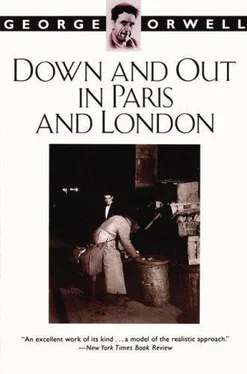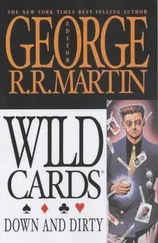George Orwell - Down and Out in Paris and London
Здесь есть возможность читать онлайн «George Orwell - Down and Out in Paris and London» весь текст электронной книги совершенно бесплатно (целиком полную версию без сокращений). В некоторых случаях можно слушать аудио, скачать через торрент в формате fb2 и присутствует краткое содержание. Жанр: Старинная литература, на русском языке. Описание произведения, (предисловие) а так же отзывы посетителей доступны на портале библиотеки ЛибКат.
- Название:Down and Out in Paris and London
- Автор:
- Жанр:
- Год:неизвестен
- ISBN:нет данных
- Рейтинг книги:5 / 5. Голосов: 1
-
Избранное:Добавить в избранное
- Отзывы:
-
Ваша оценка:
- 100
- 1
- 2
- 3
- 4
- 5
Down and Out in Paris and London: краткое содержание, описание и аннотация
Предлагаем к чтению аннотацию, описание, краткое содержание или предисловие (зависит от того, что написал сам автор книги «Down and Out in Paris and London»). Если вы не нашли необходимую информацию о книге — напишите в комментариях, мы постараемся отыскать её.
Down and Out in Paris and London — читать онлайн бесплатно полную книгу (весь текст) целиком
Ниже представлен текст книги, разбитый по страницам. Система сохранения места последней прочитанной страницы, позволяет с удобством читать онлайн бесплатно книгу «Down and Out in Paris and London», без необходимости каждый раз заново искать на чём Вы остановились. Поставьте закладку, и сможете в любой момент перейти на страницу, на которой закончили чтение.
Интервал:
Закладка:
congregation and so were not afraid of them. A man
receiving charity practically always hates his benefactor-it
is a fixed characteristic of human nature; and, when he has
fifty or a hundred others to back him, he will show it.
In the evening, after the free tea, Paddy unexpectedly
earned another eighteenpence at "glimming." It was
exactly enough for another night's lodging, and we put it
aside and went hungry till nine the next evening. Bozo,
who might have given us some food, was away all day.
The pavements were wet, and he had gone to the Elephant
and Castle, where he knew of a pitch under shelter.
Luckily I still had some tobacco, so that the day might
have been worse.
At half-past eight Paddy took me to the Embankment,
where a clergyman was known to distribute meal tickets
once a week. Under Charing Cross Bridge fifty men were
waiting, mirrored in the shivering puddles. Some of them
were truly appalling specimens-they were Embankment
sleepers, and the Embankment dredges up worse types
than the spike. One of them, I
remember, was dressed in an overcoat without buttons,
laced up with rope, a pair of ragged trousers, and boots
exposing his toes-not a rag else. He was bearded like a
fakir, and he had managed to streak his chest and
shoulders with some horrible black filth resembling train
oil. What one could see of his face under the dirt and hair
was bleached white as paper by some malignant disease. I
heard him speak, and he had a goodish accent, as of a
clerk or shopwalker.
Presently the clergyman appeared and the men ranged
themselves in a queue in the order in which they had
arrived. The clergyman was a nice, chubby, youngish
man, and, curiously enough, very like Charlie, my friend
in Paris. He was shy and embarrassed, and did not speak
except for a brief good evening; he simply hurried down
the line of men, thrusting a ticket upon each, and not
waiting to be thanked. The consequence was that, for
once, there was genuine gratitude, and everyone said that
the clergyman was a good feller. Someone (in his hearing,
I believe) called out: "Well,
he'll never be a-----bishop!"-
this, of course, intended as a warm compliment.
The tickets were worth sixpence each, and were
directed to an eating-house not far away. When we got
there we found that the proprietor, knowing that the
tramps could not go elsewhere, was cheating by only
giving four pennyworth of food for each ticket. Paddy and
I pooled our tickets, and received food which we could
have got for sevenpence or eightpence at most coffee-
shops. The clergyman had distributed well over a pound in
tickets, so that the proprietor was evidently swindling the
tramps to the tune of seven shillings or more a week. This
kind of victimisation is a regular part of a tramp's life, and
it will go on as long as people continue to give meal tickets
instead of money.
Paddy and I went back to the lodging-house and, still
hungry, loafed in the kitchen, making the warmth of the
fire a substitute for food. At half-past ten Bozo arrived,
tired out and haggard, for his mangled leg made walking
an agony. He had not earned a penny at screening, all the
pitches under shelter being taken, and for several hours he
had begged outright, with one eye on the policemen. He
had amassed eightpence -a penny short of his kip. It was
long past the hour for paying, and he had only managed to
slip indoors when the deputy was not looking; at any
moment he might be caught and turned out, to sleep on the
Embankment. Bozo took the things out of his pockets and
looked them over, debating what to sell. He decided on his
razor, took it round the kitchen, and in a few minutes he
had sold it for threepence-enough to pay his kip, buy a
basin of tea, and leave a halfpenny over.
Bozo got his basin of tea and sat down by the fire to
dry his clothes. As he drank the tea I saw that he was
laughing to himself, as though at some good joke.
Surprised, I asked him what he had to laugh at.
"It's bloody funny!" he said. "It's funny enough for
Punch
. What do you think I been and done?"
"What?"
"Sold my razor without having a shave first: Of all
the fools!"
He had not eaten since the morning, had walked several
miles with a twisted leg, his clothes were drenched, and he
had a halfpenny between himself and starvation. With all
this, he could laugh over the loss of his razor. One could
not help admiring him.
XXXIV
THE next morning, our money being at an end, Paddy and
I set out for the spike. We went southward by the Old
Kent Road, making for Cromley; we could not go to a
London spike, for Paddy had been in one recently and did
not care to risk going again. It was a sixteen-mile walk
over asphalt, blistering to the heels, and we were acutely
hungry. Paddy browsed the pavement, laying up a store of
cigarette ends against his time in the spike. In the end his
perseverance was rewarded, for he picked up a penny. We
bought a large piece of stale bread, and devoured it as we
walked.
When we got to Cromley, it was too early to go the
spike, and we walked several miles farther, to a plantation
beside a meadow, where one could sit down. It was a
regular caravanserai of tramps-one could tell it by the
worn grass and the sodden newspaper and rusty cans that
they had left behind. Other tramps were arriving by ones
and twos. It was jolly autumn weather. Near by, a deep
bed of tansies was growing; it seems to me that even now
I can smell the sharp reek of those tansies, warring with
the reek of tramps. In the meadow two carthorse colts, raw
sienna colour with white manes and tails, were nibbling at
a gate. We sprawled about on the ground, sweaty and ex-
hausted. Someone managed to find dry sticks and get a
fire going, and we all had milkless tea out of a tin "drum"
which was passed round.
Some of the tramps began telling stories. One of them,
Bill, was an interesting type, a genuine sturdy beggar of
the old breed, strong as Hercules and a frank foe of work.
He boasted that with his great strength he
could get a navvying job any time he liked, but as soon as
he drew his first week's wages he went on a terrific drunk
and was sacked. Between whiles he "mooched," chiefly
from shopkeepers. He talked like this:
"I ain't goin' far in ---Kent. Kent's a tight county,
Kent is. There's too many bin' moochin' about 'ere. The
---bakers get so as they'll throw
their bread away sooner'n give it you. Now Oxford, that's
the place for moochin', Oxford is. When I was in Oxford I
mooched bread, and I mooched bacon, and I mooched
beef, and every night I mooched tanners for my kip off of
the students. The last night I was twopence short of my
kip, so I goes up to a parson and mooches 'im for
threepence. He give me threepence, and the next moment
he turns round and gives me in charge for beggin'. 'You
bin beggin',' the copper says. 'No I ain't,' I says, 'I was
askin' the gentlemen the time,' I says. The copper starts
feelin' inside my coat, and he pulls out a pound of meat
and two loaves of bread. 'Well, what's all this, then?' he
says. 'You better come 'long to the station,' he says. The
beak give me seven days. I don't mooch from no more
---parsons. But Christ! what do I
Читать дальшеИнтервал:
Закладка:
Похожие книги на «Down and Out in Paris and London»
Представляем Вашему вниманию похожие книги на «Down and Out in Paris and London» списком для выбора. Мы отобрали схожую по названию и смыслу литературу в надежде предоставить читателям больше вариантов отыскать новые, интересные, ещё непрочитанные произведения.
Обсуждение, отзывы о книге «Down and Out in Paris and London» и просто собственные мнения читателей. Оставьте ваши комментарии, напишите, что Вы думаете о произведении, его смысле или главных героях. Укажите что конкретно понравилось, а что нет, и почему Вы так считаете.












